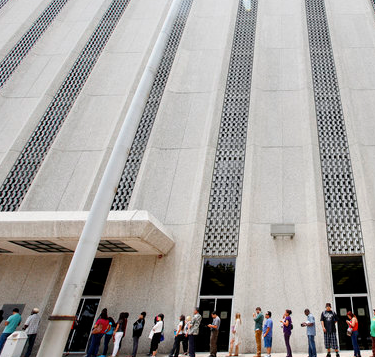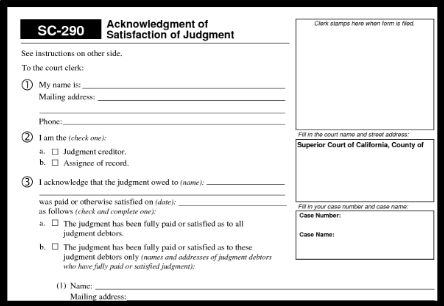By David Swedelson, Condo Lawyer and HOA Attorney; Senior Partner at SwedelsonGottlieb, Community Association Attorneys
 The Daily Journal, a newspaper for attorneys, reports weekly on various verdicts and settlements. I read those reports, as it keeps me up on what kind of cases are being filed and what kind of verdicts and settlements are being made.
The Daily Journal, a newspaper for attorneys, reports weekly on various verdicts and settlements. I read those reports, as it keeps me up on what kind of cases are being filed and what kind of verdicts and settlements are being made.
Recently, I read a report of a settlement in a lawsuit where a woman sued a property owner for damages she suffered after tripping and falling over a concrete parking barrier in a parking lot. Although the case did not involve a community association parking lot, it easily could have. The fact is, some our condo clients have been sued by owners, residents or guests after they likewise tripped over a concrete parking barrier, claiming that it was a dangerous condition because they could not distinguish the parking barrier from the asphalt parking lot surface.
In the report about the case I referenced above, the injured woman settled her claims against the property owner for $500,000. While most community associations have at least $1,000,000 liability insurance, imagine if the injuries were so severe that the injured homeowner or resident was claiming damages in excess of one million dollars. And imagine the impact on a community association’s insurance coverage, both the ability to get insurance and the cost of a liability policy after their carrier has paid out $500,000 in a liability settlement.
Continue reading
 The Greater Los Angeles Chapter of Community Associations Institute has published its May/June issue of Focus Magazine, which features an article by David Swedelson, Esq. describing case law which affects California community associations’ disclosure responsibilities. As David describes in the article, associations may be obligated to provide owners’ email addresses to an owner upon request. Follow this link to read the article.
The Greater Los Angeles Chapter of Community Associations Institute has published its May/June issue of Focus Magazine, which features an article by David Swedelson, Esq. describing case law which affects California community associations’ disclosure responsibilities. As David describes in the article, associations may be obligated to provide owners’ email addresses to an owner upon request. Follow this link to read the article.




 A few months ago I reported about
A few months ago I reported about 
 The Daily Journal, a newspaper for attorneys, reports weekly on various verdicts and settlements. I read those reports, as it keeps me up on what kind of cases are being filed and what kind of verdicts and settlements are being made.
The Daily Journal, a newspaper for attorneys, reports weekly on various verdicts and settlements. I read those reports, as it keeps me up on what kind of cases are being filed and what kind of verdicts and settlements are being made. Many owners buy units, lots or homes at community associations that have views and are later shocked to learn that the view they cherish, the view that caused them to buy that home, is not guaranteed. The question that has been posed is whether or not property owners are entitled to an unobstructed view. With some exceptions, the answer in California is “no.” The California Supreme Court spoke on this subject in the late 19th century case of Kennedy v. Burnap and established the doctrine in California that one’s ownership of land does not imply a right to force owners of neighboring land to refrain from obstructing the view from the land or the light and air reaching the land. This law has not changed all that much since that case was decided in 1898.
Many owners buy units, lots or homes at community associations that have views and are later shocked to learn that the view they cherish, the view that caused them to buy that home, is not guaranteed. The question that has been posed is whether or not property owners are entitled to an unobstructed view. With some exceptions, the answer in California is “no.” The California Supreme Court spoke on this subject in the late 19th century case of Kennedy v. Burnap and established the doctrine in California that one’s ownership of land does not imply a right to force owners of neighboring land to refrain from obstructing the view from the land or the light and air reaching the land. This law has not changed all that much since that case was decided in 1898. California community association attorneys, managers and others in the industry have differing opinions on how to properly and legally proceed with uncontested elections – elections in which the number of candidates is less than or equal to the number of board positions needed to be filled. Prior to 2006 when the election process and procedures were changed and secret elections were mandated, the answer was simple. No election was required, and candidates were deemed the elected board by way of acclamation. Since 2006, the law has changed, and elections must be held by way of a secret ballot process. Some attorneys know that the days of deeming the board elected by acclamation are over; others think the opposite.
California community association attorneys, managers and others in the industry have differing opinions on how to properly and legally proceed with uncontested elections – elections in which the number of candidates is less than or equal to the number of board positions needed to be filled. Prior to 2006 when the election process and procedures were changed and secret elections were mandated, the answer was simple. No election was required, and candidates were deemed the elected board by way of acclamation. Since 2006, the law has changed, and elections must be held by way of a secret ballot process. Some attorneys know that the days of deeming the board elected by acclamation are over; others think the opposite.
 Sometimes, owners sue their condo or homeowners association in small claims court. And sometimes, they win, and there is a judgment to be satisfied. The association pays the amount of the judgment and then wants a receipt showing that the judgment is not owed any longer. They do not know what to do when a judgment or a portion of a judgment has been satisfied. How do you get the homeowner creditor, flush with the fruits of their lawsuit, to provide their association with an “acknowledgment of satisfaction of judgment” (the form that should be completed and filed with the court to show that the judgment is no longer owed)? Board members and managers often ask why they would bother taking this step since the judgment is satisfied.
Sometimes, owners sue their condo or homeowners association in small claims court. And sometimes, they win, and there is a judgment to be satisfied. The association pays the amount of the judgment and then wants a receipt showing that the judgment is not owed any longer. They do not know what to do when a judgment or a portion of a judgment has been satisfied. How do you get the homeowner creditor, flush with the fruits of their lawsuit, to provide their association with an “acknowledgment of satisfaction of judgment” (the form that should be completed and filed with the court to show that the judgment is no longer owed)? Board members and managers often ask why they would bother taking this step since the judgment is satisfied.
